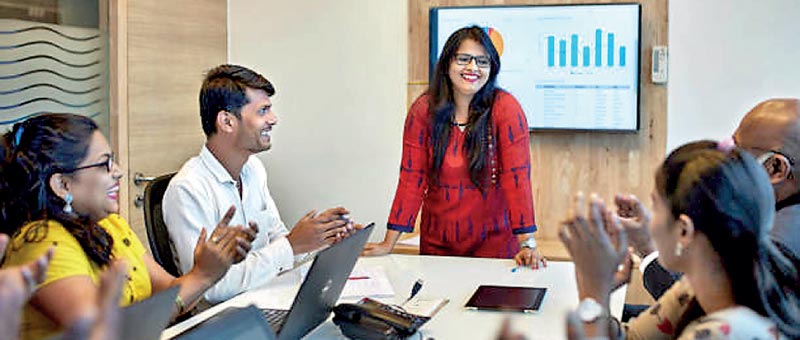Monday Mar 02, 2026
Monday Mar 02, 2026
Thursday, 17 October 2024 00:00 - - {{hitsCtrl.values.hits}}

When women are empowered, they become active contributors to the economy, driving growth and creating opportunities for all
 Women empowerment is defined as “raising the status of women through education, awareness, literacy, equal status in society, better livelihood, and also accepting women’s viewpoints as well”, and it has become a significant aspect of the socio-economic development of a country. Women empowerment is categorised into 5 main pillars, namely, social, educational, economic, political, and psychological pillars. If you look at some statistics Sri Lanka’s gender distribution is 52% females and 47% males in 2022 (Central Bank of Sri Lanka). The rural female labour force is 32.6% while the female urban labour force is 29.3%. Of the labour force, 6.5% of females are categorised as unemployed in the same year. Out of the total number of persons who migrated for foreign employment, 40% are females of whom 23.8% have migrated as housemaids.
Women empowerment is defined as “raising the status of women through education, awareness, literacy, equal status in society, better livelihood, and also accepting women’s viewpoints as well”, and it has become a significant aspect of the socio-economic development of a country. Women empowerment is categorised into 5 main pillars, namely, social, educational, economic, political, and psychological pillars. If you look at some statistics Sri Lanka’s gender distribution is 52% females and 47% males in 2022 (Central Bank of Sri Lanka). The rural female labour force is 32.6% while the female urban labour force is 29.3%. Of the labour force, 6.5% of females are categorised as unemployed in the same year. Out of the total number of persons who migrated for foreign employment, 40% are females of whom 23.8% have migrated as housemaids.
Issues women face in Sri Lanka
Urban and rural women face numerous issues in Sri Lanka, key amongst them being gender-based violence, inadequate healthcare, threats to their reproductive rights, lack of education, unequal pay, racial injustice, food insecurities, and poor mental health. Rural women specifically have to face different obstacles such as limited job opportunities, lacking access to physical markets, lacking financial literacy, and lacking opportunities for training according to research done by IPS. Lacking financial literacy (e.g. dealing with banks and other financial institutions) is a common obstacle for urban low-income earners as well. Furthermore, the burden of looking after the elderly and children, fall on the women of the household.
When one analyses this data, we cannot be happy that the Sri Lankan woman is fully empowered. She may have come a long way during the past several decades, however the progress that she has achieved is not adequate.
Political representation of women in the Sri Lankan parliament is unsatisfactory. In Sweden, women make up nearly half of the country’s parliamentarians while around 47.8% of the ministries are headed by women. Even though we currently have a lady prime minister, in most of the corporate sectors males dominate.
Gender equality is positive according to some indices in Sri Lanka; however, we have a long way to go to achieve gender parity.
When women in low-income households get harassed by their husbands or sons, they have no proper place to air their grievances. Alcohol and drugs disintegrate their family life. The Government should listen to their grievances and find suitable solutions. Domestic violence should be stopped at any cost.
Solutions
In general, solutions to some of the above issues would be having inclusive Government policies, access to justice and promoting women’s leadership at all levels of society. Mentorship programs, skill development also should be designed and made accessible to women. Rural and urban low-income families should have access to societies, and community women-based organisations with a link to the Government and policymakers. There should be an authority to voice their grievances other than a police station.
Global examples
Globally, there are countries which are best for women to live and work where women empowerment takes centre-stage. Iceland scores high with its women’s participation in corporate management, national gender gap, access to education, or political empowerment with 6 months maternity leave. Norway is also a good example with political empowerment and combined parental leave for 49-weeks. New Zealand, with its political empowerment managed to bridge the gender gap in educational attainment across all levels of education.
When women are empowered, they become active contributors to the economy, driving growth and creating opportunities for all. Women also offer unique insights and approaches that can lead to innovative solutions. Thus, with the empowerment of women, the whole country is empowered.
(The writer is a PR Consultant and a graduate of the University of Kelaniya.)